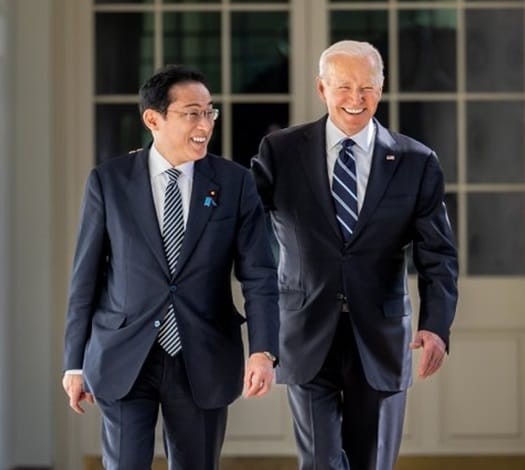Last Updated on January 14, 2023 1:55 pm by INDIAN AWAAZ
“Japan and US will further strengthen security cooperation”

AMN / WEB DESK
US President Joe Biden met Japanese Prime Minister Fumio Kishida at the White House and discussed issues related to China, North Korea and Russia and plans for deterrence in Asia with US troops and missiles.
Both countries reiterated the importance of peace and stability in Taiwan Strait and warned against any use of a nuclear weapon by Russia in Ukraine.
Besides military issues, two leaders and their aides are expected to discuss the close economic ties between the two nations and the challenges in maintaining secure global supply chains. Earlier, US and Japanese foreign and defense ministers met on Wednesday and announced stepped-up security cooperation and the US officials praised Tokyo’s military buildup plans.
Kishida and Biden issued a joint statement after the summit.
It refers to China and North Korea’s activities in the Indo-Pacific region, as well as Russia’s invasion of Ukraine.
It also says they strongly oppose any unilateral attempts to change the status quo by force.
The statement says Biden commends Japan for fundamentally reinforcing the country’s defense capabilities.
And it says the two leaders reaffirmed that the US-Japan alliance remains the cornerstone of peace, security and prosperity in the Indo-Pacific.
Kishida and Biden also reiterate the importance of maintaining peace and stability across the Taiwan Strait, and encourage the peaceful resolution of issues in the region.
The two leaders suggest their countries will work together in the fields of economic security, space exploration and energy security via “two-plus-two” talks between their foreign and economic ministers.
Earlier Japan’s Prime Minister told an audience in Washington that Japan and the United States will further strengthen security cooperation, saying “our national security strategies are aligned with each other.”
Kishida delivered his speech at Johns Hopkins University on Friday after his summit with US President Joe Biden. Kishida said Japan’s shift in security policies comes as the international community reaches what he called “history’s turning point.”
Kishida said he made two major decisions in Japan’s foreign and security policy last year.
One was a shift in Japan’s existing policy toward Russia. He said Japan imposed strict sanctions against Russia in response to its aggression against Ukraine.
He said the other shift was in Japan’s security policy, including a decision to boost defense spending and acquire the ability to launch counterstrikes.
Kishida said, “This is a clear testament to Japan’s strong resolve vis-a-vis the United States and the rest of the global community.” He said the decision will also bring benefits to the security of the entire Indo-Pacific region.
He said he is convinced the decision “represents one of the most historically critical milestones for strengthening the alliance.”
Kishida stressed that Japan’s postwar status of a peace-loving nation has not changed in the slightest.
He said he will step up diplomatic efforts by building on Japan’s enhanced defense capabilities, and is “resolved to carry forward a realism diplomacy for a new era.”
Kishida also reiterated his goals for the Group of Seven summit Japan will host in Hiroshima in May.
He said he will continue to reject Russia’s ongoing aggression against Ukraine and Moscow’s threats to use nuclear weapons. He also pledged continued support for Ukraine and efforts to preserve a free and open international order.
The prime minister said he will demonstrate the G7’s determination “with a weight that reflects the historical significance.”
Kishida described relations with China as a major challenge. He said, “The most fundamental issue is that China has some visions and claims on the international order that diverge from ours and that we can never accept.”
He said China needs to make the strategic decision that it will not change the international order in ways that are contrary to established international rules.
Kishida said both sides need to make efforts to build a “constructive and stable relationship” through dialogue at the highest possible level, including between leaders.
Kishida described the Japan-US alliance as the “anchor” to all these issues. He said Japan will further broaden and bolster areas of cooperation with the United States, in fields including economic security, science and technology and space cooperation.
